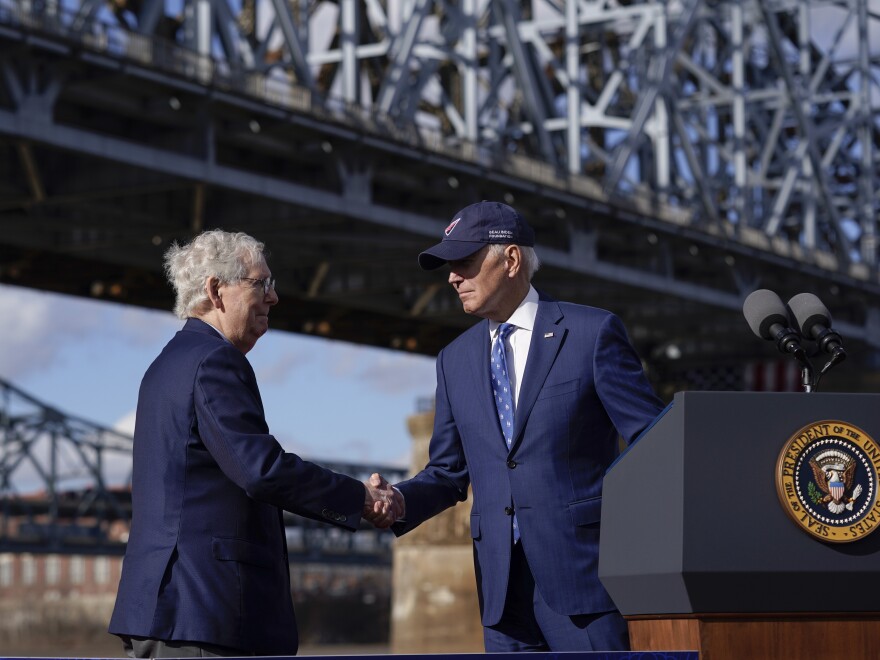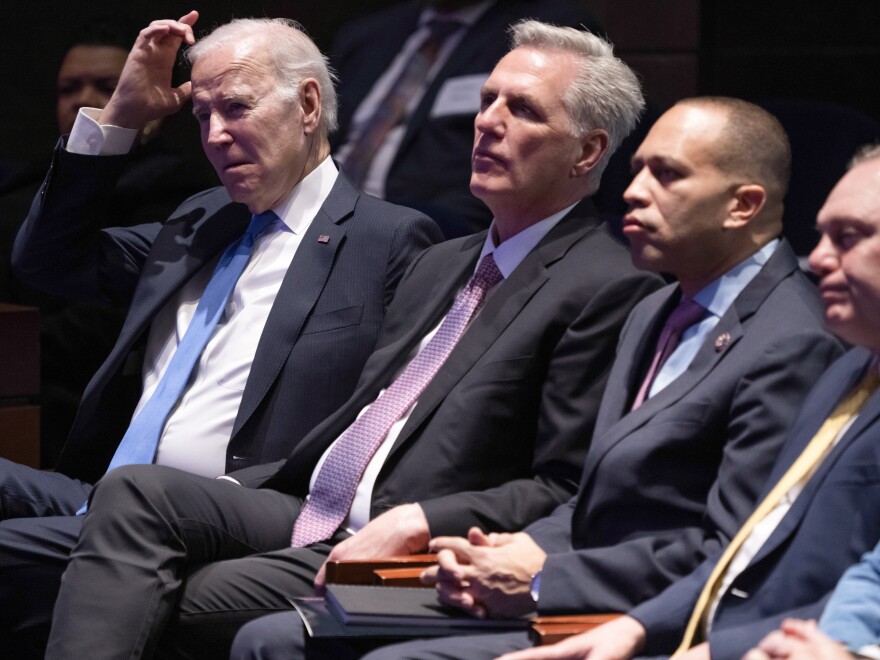When President Biden delivers his State of the Union 2023 address Tuesday evening, he'll have a new person peering over his left shoulder: Republican House Speaker Kevin McCarthy.
In a new era of divided government, the two men will be forced to forge deals on a wide range of issues over the coming two years. Most immediately, they'll need to figure out how to deescalate a standoff over the debt ceiling that could crater the economy, if it isn't resolved before the U.S. defaults on its debt.
Biden and McCarthy are both backslapping political lifers — two men who put high priority on the value of personal relationships. So the terse, blunt answers they've recently given about each other speak volumes.
"I think he's the Republican leader, and I haven't had much of an occasion to talk to him," Biden said, before quickly shifting topics, when asked about McCarthy in the immediate wake of November's election.
Ahead of their first Oval Office sit-down last week, McCarthy responded to a similar question with a lengthy verbal shrug.
"We met many times — prior to him being president," he went on to tell reporters. "Not as often, him being president. But I look forward to making this work."
There are several reasons the two didn't talk much the past two years.
Unlike in the Senate, the minority party in the House doesn't hold much leverage. And, especially in the wake of the Jan. 6 attacks, Democratic relationships with House Republicans froze to arctic levels.

Biden has a good working relationship with the top Senate Republican
It's a sharp contrast to Biden's dealings with the other top Republican in Congress — Senate Minority Leader Mitch McConnell.
When McCarthy was fighting for his job last month in round after round of speaker votes, Biden and McConnell were holding a political event together marking the bipartisan infrastructure law.
"I asked permission if I could say something nice about him," Biden joked as he praised McConnell from the stage. "I said I'd campaign for or against him, whichever helped most. Mitch: it wasn't easy to get this done."
In Biden's final days as vice president, McConnell memorably praised Biden, and moved to rename a piece of legislation after Biden's late son Beau, as Biden presided over the chamber and wiped tears from his eyes.

Here's how Biden and McConnell worked on a debt ceiling deal
Though the two men don't agree on much, Biden and McConnell worked together to cut three major bipartisan deals during the Obama era — including a 2011 agreement when the U.S. was on the brink of defaulting on its debt.
Neither man tried to convert the other during those high-stakes talks.
"Biden would repeatedly say, I won't tell you your politics, you won't tell me mine. If you tell me you can't do something, I take you at your word. If you tell me I can't do something, you take me at my word," said Rohit Kumar, a top McConnell staffer at the time, who now co-leads Pricewaterhouse Cooper's national tax office.
Kumar viewed the 2011 debt standoff as near-identical to how the 2023 negotiations are beginning: House, not Senate, Republicans, leading the charge to force spending cuts, and having more leverage to do so.
Back in 2011, the talks had stalled, and default was looming, by the time Biden and McConnell sat down together.
Kumar recalled the blunt, direct mindset the two men took as they looked for a deal: "OK. These are the parameters from which we have to operate. We have no choice but to work within these parameters, and we're going to get this done," he said.

There are two main differences in the dynamics for McCarthy
Biden's working relationship with the Senate leader is grounded in two things McConnell has that McCarthy doesn't have: decades of time in the legislative trenches alongside Biden; and perhaps more importantly, a firm grip over the politics of his caucus.
McConnell is the longest-serving Senate leader from either party. McCarthy, on the other hand, needed 15 rounds of voting to win the speakership this year. With the narrow margins his party holds, he's constantly at the mercy of whatever small group of House Republicans who threaten to vote no.
That's a position the White House has been happy to highlight and politically exploit.
Since Republicans have taken control of the House, the Biden administration has tried to frame the GOP as split between two wings: one that is at times willing to help govern and pass bills on a bipartisan basis; the other, an extreme faction still under the sway of former President Donald Trump.
"We understand what the speaker is going through," White House Press Secretary Karine Jean-Pierre told reporters Wednesday. "He has a caucus that has put forth some pretty extreme ideas. Some extreme options in front of the American people. Cutting Medicare, cutting Social Security. That is what he's dealing with."
At a New York fundraiser last week, Biden spoke about McCarthy's position with an incredulous tone. "Look at what he had to do" to win the speakership, Biden said. "He had to make commitments that are just absolutely off the wall for a speaker of the House to make, in terms of being able to become the leader."

Biden and McCarthy are both 'hail-fellow-well-met,' says Rep. Cole
Despite their differences, Biden and McCarthy will have to work together. House Republican Tom Cole thinks it's possible.
"I've always thought they could have a good relationship," he said. "I think they are both career public servants. I think they are both extremely political. I think they are both pragmatic. I think they are both 'hail-fellow-well-met.' And I think they can both make a deal."
The first potential deal on their agenda has global stakes: averting the almost-certain instant recession that would come from the federal government defaulting on its debt.
Biden says a congressional debt ceiling vote shouldn't come with any preconditions. McCarthy is refusing to raise it without an agreement to cut spending elsewhere.
Last week, the president and speaker met in the Oval Office for an hour.
"He gave me his perspective. I gave him our perspective," McCarthy said afterwards. "I believe in hearing both perspectives, like anything else, be it business, be it in family, be it in relationships — that you can find common ground."
One thing that's different from those types of relationships: the fate of the entire economy typically doesn't ride on their ability to get on the same page.
NPR's Barbara Sprunt contributed to this report.
Copyright 2023 NPR. To see more, visit https://www.npr.org.




